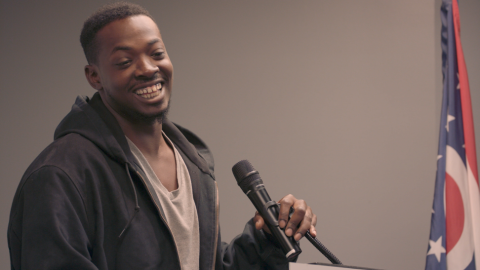Some students like academic work and thrive in high school. For others, it’s a real drag.
One of those people is Mac Connor. When the 18-year-old talks about it, he does so in a short, matter-of-fact way.
“I was never really a fan of school," Connor says.
In high school, Connor didn’t know why he needed to learn the basics – you know, reading, writing and arithmetic – over and over again.
“You add on just a little bit more. Just one year after another year, it’s just a little bit harder, a little bit harder, a little bit harder,” Connor says. “You kind of get the gist. There’s a lot of jobs that you do need that. But for me, I really don’t need to learn that stuff.”
Connor knew what he wanted to do – work on cars as a mechanic. But school wasn’t preparing him for that, so there was no incentive to go.
This changed, however, when he visited Fort Hayes Career Center his sophomore year. Fort Hayes is a magnet school with a career-technical education. Students attend their home school for half the day and learn career skills at Fort Hayes during the other half.
When Connor learned about their automotive mechanic program, he decided to finish up his junior and senior years at Fort Hayes.
The school is tapped into the needs of local employers, one of which is the Central Ohio Transit Authority. Tracy Spikes, a learning and development coordinator for COTA, says her company needs more mechanics and thought that Fort Hayes could help.
“So we knew that we had a shortage in mechanics and we had to think about what resources in the community could we utilize to fill that gap - that skills gap,” Spikes says. “And not only do that, but in turn, train our own workforce. So we chose to seek out different career-tech programs that included an automotive program.”
Together, Fort Hayes and COTA created an internship open to students in the automotive technology program that pays $10 an hour. Connor took advantage of the opportunity.
That’s where he learned the ins and outs of maintaining and working on COTA buses, from cleaning to fixing them.

The program not only provides students with on-the-job experience, it also promises a job at COTA immediately after high school graduation. Graduates then become apprentices in the local Transport Workers’ Union, where they will eventually become technicians and journeymen and make as much as $30 an hour.
The idea is to retain the workers that COTA already trained.
“We had the talent here and it’s really hard to find good talent, Spikes says. “But when you know what you have right here in front of you - why would you let that walk out the door?”
Meeting the traditional graduation requirements at his old school was a challenge for Connor. But Ohio has three paths to graduation: You can achieve a minimum score on the ACT or SAT, you can pass an exit exam, or, as Connor did, you can earn an industry credential.
Industry credentials are a business or trade association’s approval, showing that the student demonstrates a mastery of skills. This system helps Connor and other students like him who aren’t thriving in a conventional school setting to excel and graduate.

Down at COTA’s shop on Broad Street, Connor and the band of recent hirees from the Fort Hayes partnership walk down the pedestrian strip. Long buses coast around them.
It’s the last day before the big test that officially allows them to drive these buses. When a bus breaks down, Connor’s the one who will drive it back to the shop and repair it. This is the type of work he wants to be doing.
“What I do here is what I like to do,” he says. “I don’t like sitting down in an office sitting in front of a computer. I like working with my hands.”
Since WOSU last spoke with Connor, he passed the big test - the CDL - or Commercial Driving License test that qualifies him to drive COTA buses. Now he’s making almost three times what he did as an intern for COTA.
Partnerships with schools and businesses are helping students like Connor connect to available jobs. And this, in turn, keeps COTA buses rolling.
This story comes from the Rivet podcast, which is part of American Graduate.






